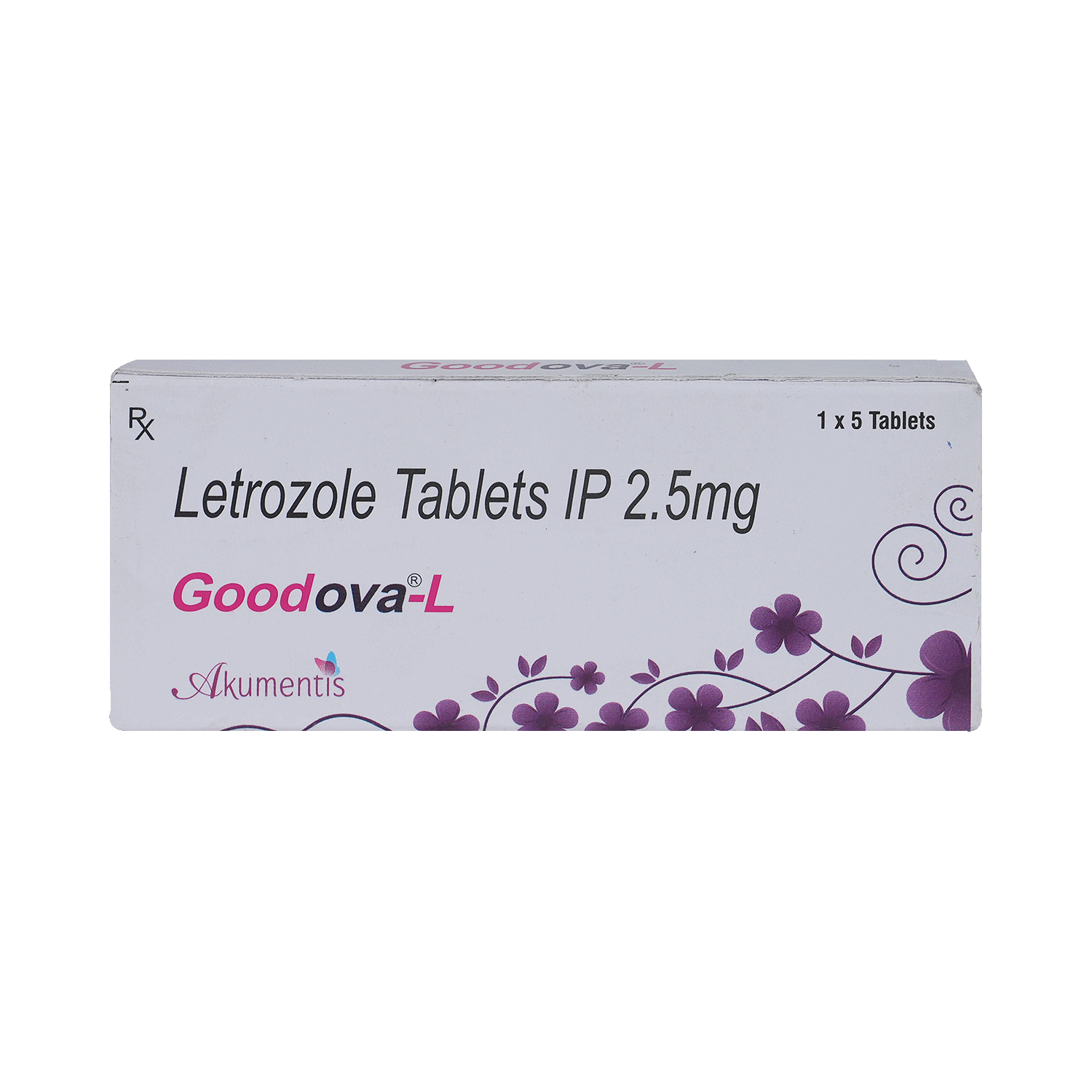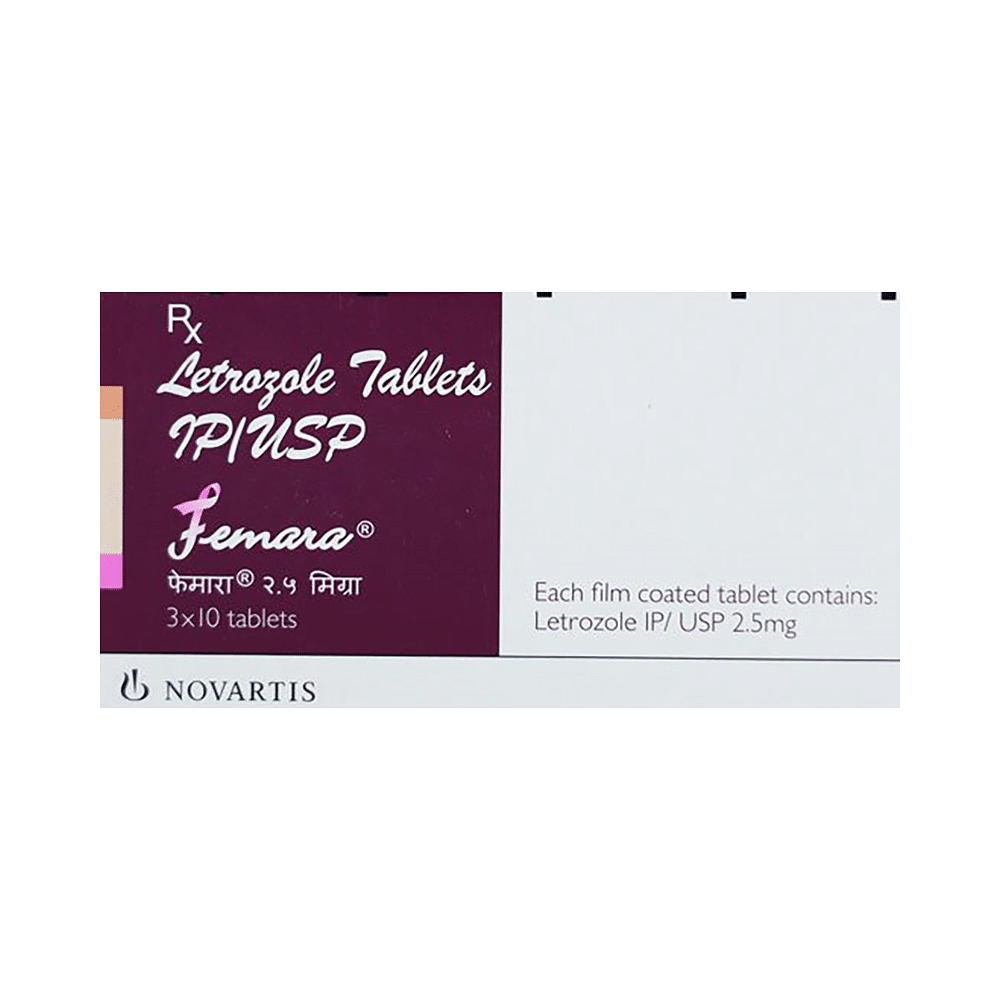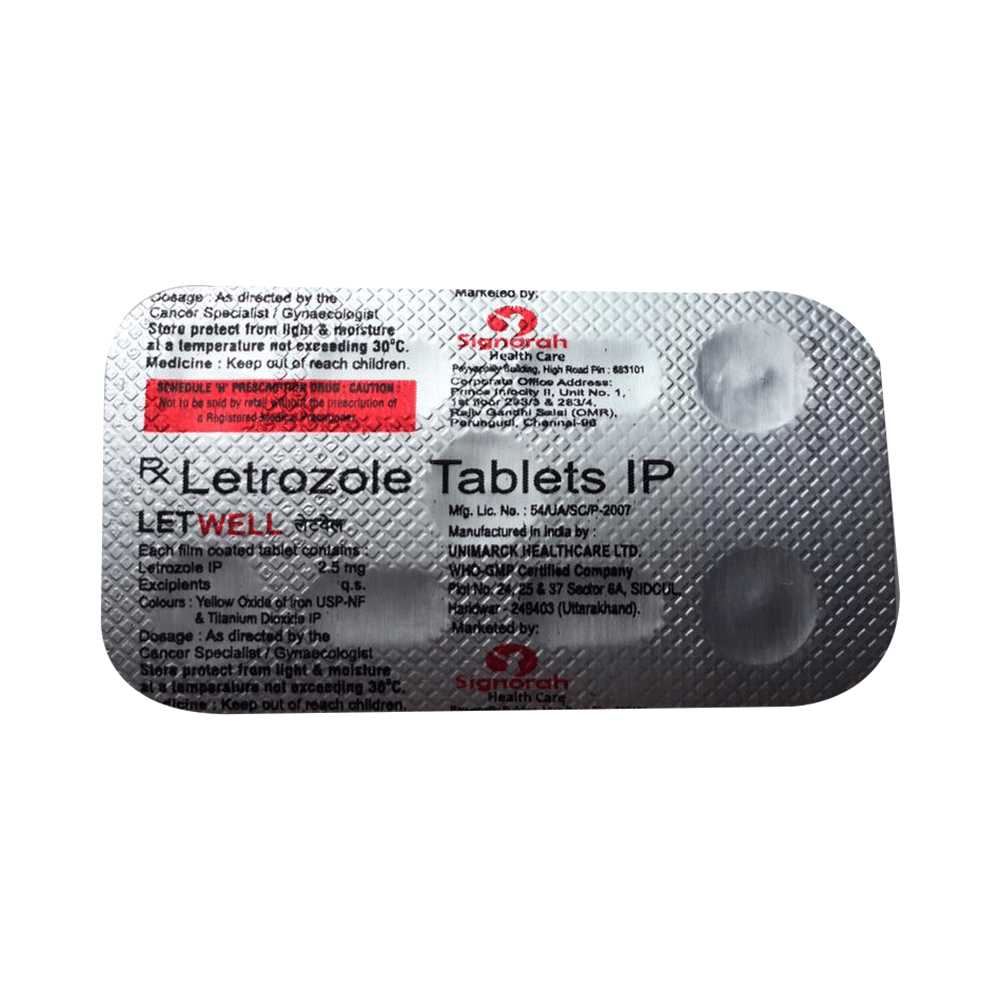
Truvizole New 2.5mg Tablet
Manufacturer
Gynavista
Salt Composition
Letrozole (2.5mg)
Key Information
Short Description
Truvizole New 2.5mg Tablet is used to treat breast cancer in post-menopausal women, either alone or with other treatments, and to stop the tumor from spreading to other parts of the body.
Dosage Form
Tablet
Introduction
Truvizole New 2.5mg Tablet is an aromatase inhibitor that helps treat breast cancer in post-menopausal women. It works by decreasing the amount of estrogen produced in the body, which can slow down or stop the growth of some breast cancers that need estrogen to grow. It may be used alone or with other treatments, such as surgery or radiation.
Directions for Use
Take this medicine in the dose and duration as advised by your doctor. Swallow it as a whole. Do not chew, crush or break it. Truvizole New 2.5mg Tablet may be taken with or without food but it is better to take it at a fixed time.
Safety Information
Side Effects
No common side effects listed.
Alcohol Warning
Consuming alcohol with Truvizole New 2.5mg Tablet does not cause any harmful side effects.
Breastfeeding Warning
Truvizole New 2.5mg Tablet is unsafe to use during breastfeeding. Data suggests that the drug may cause toxicity to the baby.
Pregnancy Warning
Truvizole New 2.5mg Tablet is highly unsafe to use during pregnancy. Seek your doctor's advice as studies on pregnant women and animals have shown significant harmful effects to the developing baby.
Interacting Medicines
Estradiol Ethinyl Estradiol Tibolone Estriol
How it works
Truvizole New 2.5mg Tablet is an aromatase inhibitor. It works by decreasing the amount of estrogen (natural female hormone) produced in the body. This decrease in estrogen can slow down or stop the growth of some breast cancers that need estrogen to grow.
Quick Tips
You have been prescribed Truvizole New 2.5mg Tablet for the treatment of breast cancer. It can be taken with or without food. Do not drive or do anything requiring concentration until you know how Truvizole New 2.5mg Tablet affects you. It may cause increased sweating and hot flushes. Try to keep cool by wearing light and airy clothes. Your doctor may monitor your cholesterol level and bone mineral density (BMD) regularly as Truvizole New 2.5mg Tablet can alter their levels.
Related Medicines

Goodova-L Tablet

Letoval Tablet

Letsi 2.5mg Tablet

Femara 2.5 Tablet

Letroz 2.5 Tablet

Letroz Tablet

Letzol 2.5 Tablet

Ovastim LZ 2.5mg Tablet

Letwell Tablet

Letrosis 2.5mg Tablet
Frequently asked questions
Why have I been prescribed Truvizole New 2.5mg Tablet?
Truvizole New 2.5mg Tablet is an aromatase inhibitor, prescribed to treat estrogen-dependent breast cancer in women who no longer have periods due to menopause, surgery, or chemotherapy.
How does Truvizole New 2.5mg Tablet work?
Truvizole New 2.5mg Tablet is an anti-estrogen drug that acts by blocking the enzyme aromatase, which produces estrogen in your body. Estrogen stimulates certain types of breast cancer growth. By reducing estrogen production, Truvizole New 2.5mg Tablet may prevent tumor growth.
For how long should I take Truvizole New 2.5mg Tablet?
If the breast tumor is in an advanced stage or has spread to other parts of the body, continue taking Truvizole New 2.5mg Tablet until the tumor shows progression. If given after tamoxifen (another anti-estrogen used for breast cancer) or surgery, it should be continued for 5 years or until the tumor comes back, whichever is first. It can also be administered as sequential treatment: 2 years of Truvizole New 2.5mg Tablet followed by 3 years of tamoxifen.
If I am taking irbesartan to control my blood pressure, can I take Truvizole New 2.5mg Tablet?
Yes, you can take irbesartan and Truvizole New 2.5mg Tablet together. However, be careful and monitor your blood pressure regularly as Truvizole New 2.5mg Tablet may increase it.
Does Truvizole New 2.5mg Tablet affect vision?
Although rare, Truvizole New 2.5mg Tablet can cause a cataract. If you experience blurred vision or eye irritation, consult your doctor immediately.
My friend who is taking Truvizole New 2.5mg Tablet often sweats a lot. Is it because of Truvizole New 2.5mg Tablet?
This could be due to hot flushes, which are a common side effect of Truvizole New 2.5mg Tablet. They occur due to the decrease in estrogen levels. The frequency of hot flushes reduces as your body adjusts to the treatment. In some cases, the flushes and sweats may persist during treatment and stop a few months after it ends. Consult your doctor if they are troublesome.
What are the serious side effects of Truvizole New 2.5mg Tablet?
Serious side effects of Truvizole New 2.5mg Tablet, although rare, include stroke, angina, heart attack, blood clotting, cataract, osteoporosis, and severe skin reactions.
Does Truvizole New 2.5mg Tablet cause bone loss?
Truvizole New 2.5mg Tablet can cause thinning or wasting of your bones (osteoporosis), which is due to the decrease in estrogen levels in your body.
Can I take Truvizole New 2.5mg Tablet for induction of ovulation in anovulatory infertility?
According to the Ministry of Health and Family Welfare, Truvizole New 2.5mg Tablet is restricted for use in inducing ovulation in anovulatory infertility.


